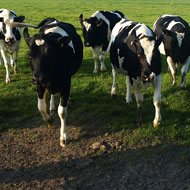New test to improve liver fluke control

“Looking to the future, reliance on deworming treatments alone is likely to be unsustainable."
A new test to screen herds for liver fluke is promising to improve parasite control and reduce the risk of cattle developing immunity to existing treatments.
The new test involves collecting faecal samples from a number of cattle in the herd, analysing them in the lab and reporting a single count. It was developed as part of a project by the University of Liverpool, the Moredun Research Institute and AHDB.
Known as ‘composite faecal egg counting’, the new method is suitable for dairy and beef cattle. It allows herds to be screened for infection and targeted treatment administered as needed. AHDB says the test is ‘at least as good as other diagnostic methods’ when it comes to identifying infected herds.
“Controlling liver fluke is a difficult task, particularly because of emerging resistance to some of the flukicidal products used to treat cattle and sheep,” said Mary Vickers, senior scientist at AHDB Beef & Lamb.
“Looking to the future, reliance on deworming treatments alone is likely to be unsustainable so treatment informed by diagnosis is crucial for disease control.”
Cattle are infected with liver fluke through eating grass that is contaminated with cysts containing fluke eggs. These are shed from mud snails in damp, marshy areas of pasture. Wet weather during late summer is likely to increase the risk of infection on many farms this year, according to forecasts.
Liver fluke infection can lead to serious production losses, extending time to slaughter and reducing milk yield by up to 15 per cent.
The project team are now working to develop pen-side tests, allowing vets and farmers to give diagnostic results and targeted treatments immediately.



 The Federation of Independent Veterinary Practices (FIVP) has announced a third season of its podcast, Practice Matters.
The Federation of Independent Veterinary Practices (FIVP) has announced a third season of its podcast, Practice Matters.